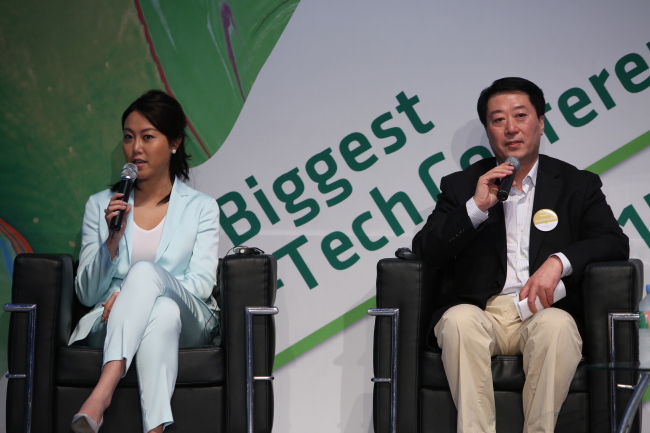More than 100 tech-savvy Korean venture firms gathered last week at the Seoul-based start-up conference beGLOBAL SEOUL 2015, as an outlet for fostering new business, market expansion and sharing industry insights.
Beijing-based startup accelerator TriBeluga, in its move to attract prospective Korean start-ups to China, joined hands with Chinese government officials for the introduction of Zhongguancun ― a tech district in Beijing, which the government hopes to foster as the Asian version of the California-based Silicon Valley.
“A key difference between the market-driven Silicon Valley and China’s Zhongguancun is that there are diverse state-sponsored subsidies and incentives available at ZGC,” director of the ZGC Development Group Shao Shun Chang told the local media after speaking at the Seoul tech conference on Friday.
Beijing-based startup accelerator TriBeluga, in its move to attract prospective Korean start-ups to China, joined hands with Chinese government officials for the introduction of Zhongguancun ― a tech district in Beijing, which the government hopes to foster as the Asian version of the California-based Silicon Valley.
“A key difference between the market-driven Silicon Valley and China’s Zhongguancun is that there are diverse state-sponsored subsidies and incentives available at ZGC,” director of the ZGC Development Group Shao Shun Chang told the local media after speaking at the Seoul tech conference on Friday.

The Zhongguancun district, composed of eight specialized technology parks, is home to some 15,000 start-ups ― with an annual growth rate of 40 percent ― and roughly 1.9 million employees, said TriBeluga founder and CEO Lili Luo.
Some of China’s most successful new companies including the world’s third largest phone maker Xiaomi, China’s dominant search engine Baidu and Chinese electronics firm Lenovo were born in the Beijing tech hub.
“Given the wealth of young entrepreneurs and science and technology capital in Korea, there is no reason why China and Korea should not cooperate,” the ZGC director said, adding that China possesses wide, lucrative markets for novel technologies developed by Korean companies.
In 2014, the district birthed 49 start-ups daily, boosted by more than 1,600 technology incubators in China, the country’s Science and Technology Minister Wan Gang said in March according to a Bloomberg report. China now reportedly has more than 1,000 organizations investing in start-ups with capital exceeding 350 billion yuan ($56 billion).
According to Shao, “foreign start-ups seeking to commercialize their businesses can bring patented technology and some starting capital to China, after which Zhongguancun makes the appropriate investments.”
“The start-up could sell its technology, merge with a similar Chinese venture firm or establish a new company,” he said, citing examples of American companies incubated in the Beijing-based tech district.
Playing a key role in helping foreign firms navigate such complex processes is TriBeluga ― one of the cosponsors of the conference ― which Shao said plays a crucial role in “bridging Korean innovation with the resources offered by Zhongguancun.”
“TriBeluga is the only platform that connects Korea and China with Silicon Valley-based entrepreneurs,” Luo said.
“Korea possesses one of the greatest markets that many Chinese, Americans and all kinds of international business people want to learn from. It has one of the top three (tech) ecosystems in Asia, coupled with the strong support of the government,” she added.
“That is why we believe we can help the Korean start-ups enter China, to work with Chinese start-ups, so that they can all share their strengths and create value for the world.”
At the Seoul tech conference on Friday, the start-up accelerator awarded the TriBeluga Prize to Nthing ― a Korean tech start-up which applied IoT technology to planting to develop a specialized system able to monitor and grow plants via the Internet.
Nthing will be invited to attend an annual tech conference in China hosted by TriBeluga to discuss opportunities to introduce and expand its business in the country.
By Sohn Ji-young (jys@heraldcorp.com)








![[Today’s K-pop] BTS pop-up event to come to Seoul](http://res.heraldm.com/phpwas/restmb_idxmake.php?idx=644&simg=/content/image/2024/04/17/20240417050734_0.jpg&u=)
![[Graphic News] More Koreans say they plan long-distance trips this year](http://res.heraldm.com/phpwas/restmb_idxmake.php?idx=644&simg=/content/image/2024/04/17/20240417050828_0.gif&u=)






![[KH Explains] Hyundai's full hybrid edge to pay off amid slow transition to pure EVs](http://res.heraldm.com/phpwas/restmb_idxmake.php?idx=652&simg=/content/image/2024/04/18/20240418050645_0.jpg&u=20240419100350)

